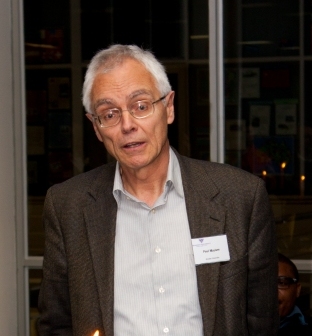
“I began my research career about 40 years ago, at a time when historical writing about South Africa was beginning to move along exciting fresh paths,” says Head of History Department, Prof Paul Maylam. “New work in the political economy tradition was transforming the way in which South Africa’s past – and present – were being interpreted.”
Prof Maylam was delivering his Vice-Chancellor's 2011 Distinguished Senior Research Award lecture entitled: "Forty years of historical research in South Africa: some general trends and personal recollections".
He says this approach viewed apartheid more as modes of class exploitation than as racial segregation. With cheap, migrant labour, on which the early gold-mining industry depended, “a system developed that enabled the industry to become highly profitable, but also brought in its wake far-reaching consequences – a pattern of white racial domination, together with a widespread social breakdown in town and countryside, largely precipitated by the migrant labour system.”
He later touched on how many historians consider the mining industry as old-hat, “but the events of recent weeks tell us that the industry is still at the centre of class struggles that continue to rage in the country that is the most unequal in the world”.
In outlining the history of the Durban system of so-called native administration, he criticised “the assumption that the main culpability for apartheid rests on the shoulders of the Afrikaner-dominated National Party”.
The foundations of apartheid were firmly laid before 1948, and cities like Durban pioneered the development of urban apartheid. “There is a tendency on the part of English-speakers to deny responsibility for past and present wrongs – what I call ‘the clean hands syndrome’ – ‘we were not responsible for apartheid, nor were we tainted by the violence that ravaged the country during the liberation struggle’. There is complicity in the past and this need to be acknowledged.”
Noting that white English speakers haven’t taken centre stage as political leaders in South Africa, he added “One of the last significant English-speaking political leaders to enjoy power was Cecil Rhodes, 120 years ago, as prime minister of the Cape”.
Prof Maylam focussed his research on Cecil Rhodes in 2000 when there were three centenaries looming: the centenary of Rhodes’ death in 2002, the centenary of the Rhodes Scholarships in 2003, and of the university itself in 2004. Intending to write only an article, he found an abundance of material to work with including over 30 biographies, novels and statues and memorials.
“The more I delved into his own private papers, the more I discovered about his dealings, the less I liked him. But somehow he managed to find his way into the titles of two of my books, and I have spent 25 years of my life studying and working at an institution named after him – happily I may add.”
After deciding he would like to research “more likable people” he asked friends and colleagues to think of a world leader they admired. He selected six 20th-century heads of government –including Nelson Mandela– who displayed certain desirable qualities in the way in which they governed, and wrote 15 000-word biographical essays on each of them.
Drawing attention to a challenge that faces many academics today, Prof Maylam says he believes there exists “a crisis of research overproduction and under-consumption” with a great number of journal articles being published “that hardly anybody is reading – a consequence of the ‘publish or perish’ syndrome”. He says academics are pressured to spend a great deal of time producing research outputs, in turn having less time to “read this growing body of literature”.
Being keen to pass on some advice to young researchers, he spoke at length about juggling the pressures of research and writing, admin and community engagement, advising not to be too overwhelmed by these demands.
“Think positively about what you are achieving, not negatively about those areas in which you feel you are not meeting the demands.” He further advised academics to not just ‘follow the money’ by engaging in research if there’s funding for it- “especially if the field does not particularly interest you”. In short, “Try to discover as soon as possible the research area that really interests and excites you.”
“There needs to be a higher purpose – a desire to make some kind of contribution to society, perhaps an emancipatory one.”
Prof Maylam was bestowed Distinguished Professor in April this year. He is an accomplished researcher, writer and lecturer. He has written over five books and co-edited a sixth. He is the only academic to receive the Vice-Chancellor’s Book Award twice and has been an HOD for over 23 consecutive years, both at the University of Natal and Rhodes.
Story by Anna-Karien Otto
Photo by Adrian Frost
